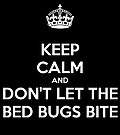This is a topic few like to discuss but it is out there and needs to be dealt with! I’m talking about bed-bugs, those pesky little creatures that are harder than heck to get rid of!
What are bed-bugs? To paraphrase from Wikipedia:
Bed-bugs are parasitic insects that feed exclusively on blood The name “bed-bug” derives from the preferred habitat of warm houses and especially near or inside beds and bedding or other sleep areas. Bed-bugs are mainly active at night but are not exclusively nocturnal. They usually feed on their hosts without being noticed.
A number of adverse health effects may result from bed bug bites, including skin rashes, psychological effects, and allergic symptoms. They are not known to transmit any pathogens as disease vectors. Certain signs and symptoms suggest the presence of bed-bugs; finding the insects confirms the diagnosis.
Bed-bugs have been known as human parasites for thousands of years. At a point in the early 1940s, they were mostly eradicated in the developed world, but have increased in prevalence since 1995 Because infestation of human habitats has been on the increase, bed bug bites and related conditions have been on the rise as well.
So why should you care about bed-bugs? Well, if you’re moving into an apartment or retirement community, you are among a lot of other people any of which could have bed-bugs. I don’t want to cause a panic, but this is a real thing! Does your community have a bed-bug protocol in place in case bed-bugs are found? Doesn’t hurt to ask!
As a Senior Move Management Company and a Local Moving Company we have found it imperative to have a bed-bug protocol in place, not only for our customers but for our employees as well.
Every customer we work with is given information about bed-bugs and how to inspect for them. They are required to sign a form stating they have inspected for bed-bugs themselves and also giving us permission to inspect before we move them.
We have steps in place in case bed-bugs are found, so we are not spreading them to another location.
This is something not to be alarmed about but to be aware of. The question is, are you, the facility you live in (or are moving to) and your moving company doing all they can to help prevent the spread of these pesky critters?

